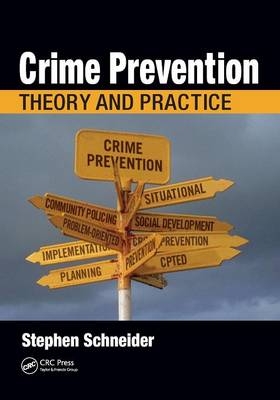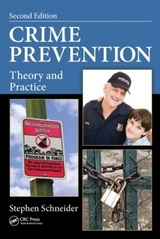
Crime Prevention
Crc Press Inc (Verlag)
978-1-4200-6214-4 (ISBN)
- Titel erscheint in neuer Auflage
- Artikel merken
Characterized both by its interdisciplinary and its applied nature, crime prevention is influenced by diverse fields such as psychology, sociology, criminology, health care, urban planning and design, education, economics, community development, and social work, among others. The study of crime prevention is also focused on developing and evaluating interventions for applications in real-world settings. In addition to exploring basic concepts and theories, Crime Prevention: Theory and Practice reflects the predominantly applied nature of the field, offering readers the knowledge and skills necessary to plan, implement, evaluate, and sustain effective crime prevention interventions.
The book examines dominant approaches (situational, social development, community crime prevention, and community policing), as well as process-oriented issues essential to its application (planning, implementing, and evaluating a crime prevention project), balancing a scholarly analysis of the subject while imparting useful skills.
Emphasizing an experiential learning approach, this text:
Presents an introduction to and overview of the theory and practice of crime prevention
Explains how etiological theories of crime and criminal behavior inform each of the dominant crime prevention approaches
Encourages the development of knowledge, expertise, and practical skills among students and crime prevention practitioners that can be applied in the real world
Provides a detailed, step-by-step approach to the planning, implementation, evaluation, and maintenance of successful crime prevention interventions
Enhances the development of critical analytical thinking, communication, and writing skills of the reader
The text includes learning objectives, discussion questions, case studies, interactive exercises, and field research assignments which ground the theoretical concepts in a practical framework, providing an optimal learning experience for students and practitioners alike.
Stephen Schneider, Ph.D., is an associate professor in the Department of Sociology and Criminology at Saint Mary’s University in Halifax, Nova Scotia, Canada. His main areas of expertise and interest include crime prevention, organized crime, and policing and law enforcement. He has worked in the field of crime prevention for more than 20 years as a scholar, researcher, community-based practitioner, consultant, and government policy analyst.
Crime Prevention: An Overview
The Theory and Practice of Crime Prevention: An Overview
Dominant Crime Prevention Approaches
Situational Crime Prevention and CPTED
Crime Prevention through Social Development
Community Crime Prevention
The Role of Government and Police in Crime Prevention
The State and Crime Prevention
Policing for the Prevention of Crime: Community and Problem-Oriented Policing
Planning, Implementing, and Evaluating a Crime Prevention Project
The Crime Prevention Project, Phase One: Planning
The Crime Prevention Project, Phase Two: Implementing a Crime Prevention Project
The Crime Prevention Project, Phases Three and Four: Evaluating and Adjusting the Crime Prevention Plan
Bibliography
Index
| Erscheint lt. Verlag | 6.10.2009 |
|---|---|
| Zusatzinfo | 9 Tables, black and white; 11 Illustrations, black and white |
| Verlagsort | Bosa Roca |
| Sprache | englisch |
| Maße | 178 x 254 mm |
| Gewicht | 726 g |
| Themenwelt | Recht / Steuern ► Strafrecht ► Kriminologie |
| ISBN-10 | 1-4200-6214-X / 142006214X |
| ISBN-13 | 978-1-4200-6214-4 / 9781420062144 |
| Zustand | Neuware |
| Haben Sie eine Frage zum Produkt? |
aus dem Bereich



